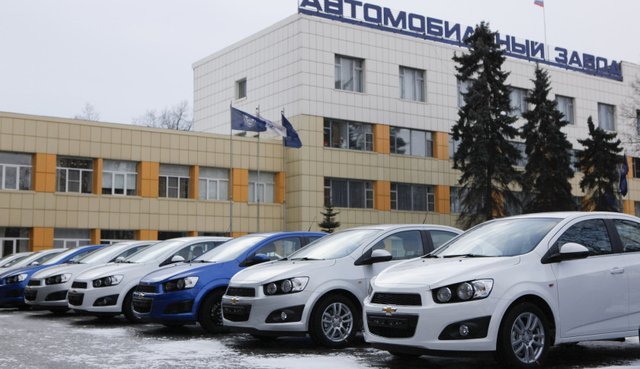In Russia, All Are Losing, But None Are Leaving

But for now, with the collapse of the ruble and cratering auto sales, the red ink is flowing.
"It's a bloodbath for everybody. All car manufacturers are losing money," Renault-Nissan CEO Carlos Ghosn told reporters in Japan on Friday, according to Reuters.
General Motors, Audi, Renault-Nissan and Jaguar Land Rover temporarily halted or limited sales last week in response to the volatility of the ruble, which has lost more than 40 percent of its value against the dollar since Jan. 1. Others, including Ford and BMW, have increased prices as they struggle to stem rising losses.
U.S. automakers have been hit particularly hard. Through November, Ford sales fell 40 percent to 56,807 on the back of collapsing demand for its best-selling Focus, while GM's Chevrolet and Opel brands lost a combined 26 percent to post sales of 169,005.
Russia has become vitally important for automakers in recent years as the market surged to 2.9 million annual sales in 2012 to become the second largest in Europe behind Germany.
Automakers such as Ford, GM, Volkswagen, Nissan, Toyota, Hyundai and Kia have been enticed to build there with the promise of favorable taxes. But automakers now are suffering from what one analyst has described as Russia's "endemic volatility."
Sales down 12%
Sales of cars and light-commercial vehicles were down 12 percent through November to 2.2 million, according to data from the Association of European Businesses. That pushes the country to third behind the United Kingdom in European sales and raises the specter that 2015 sales could slump close to 2009's low of 1.5 million.
Ford said in September that problems in Russia meant it wouldn't achieve its long-predicted return to European profitability in 2015, saying it expected to lose $250 million in the region instead. A spokesman for Ford of Europe told Automotive News last week that the recent currency collapse hadn't changed its prediction.
Meanwhile, GM partly blamed problems in Russia for its third-quarter loss of $387 million in Europe. GM has said it will return to a profit in Europe in 2016.
Nobody is talking of leaving, however.
"The present business environment in Russia is challenging and fluid, but this is a key market with the potential to be the largest in Europe at some point in the future," the Ford of Europe spokesman said. Ford makes "99 percent" of all its vehicles sold in Russia in the country and recently began making the EcoSport subcompact SUV in the newest of three Russian plants it runs in a joint venture with Sollers. In 2015, it will add the Fiesta to take advantage of the growing subcompact market.
VW is 'committed'
A spokesman for the VW Group told Automotive News that the company is "committed to the Russian market and is ... fulfilling its investment program in Russia." VW will open a new engine operation at its Kaluga plant in 2015.
Ghosn told reporters on Friday that he predicted the Russian market would stabilize, without giving a time frame. Nissan has just started production of the new X-Trail midsize SUV at its plant in St. Petersburg and in 2015 will add the Qashqai compact SUV, a vehicle it currently imports. Nissan's head of production in Europe, Colin Lawther, said profits on the big-selling Qashqai were being hit. "Clearly, when we start producing in Russia, it'll be better for us," he said.
Renault-Nissan has benefited from its takeover of local maker Lada's parent company, AvtoVAZ, and is one of the few automakers to have sales rise this year, mainly due to the popularity of its budget Almera compact model made in AvtoVAZ's giant Togliatti factory.
Automakers building locally have had some protection against the ruble collapse, but a prolonged downturn could force them to revise long-term plans, said Nikolaus Lang, senior partner at Boston Consulting Group.
"Should this situation continue for six to 12 months, then it will definitely impact the thinking of some OEMs," he said.
They could yet grow tired of riding out Russia's boom-and-bust car market. IHS Automotive principal analyst Tim Urquhart said in a note: "There is little point in manufacturing and importing vehicles that are going to lose money."
Nouvelles connexes


